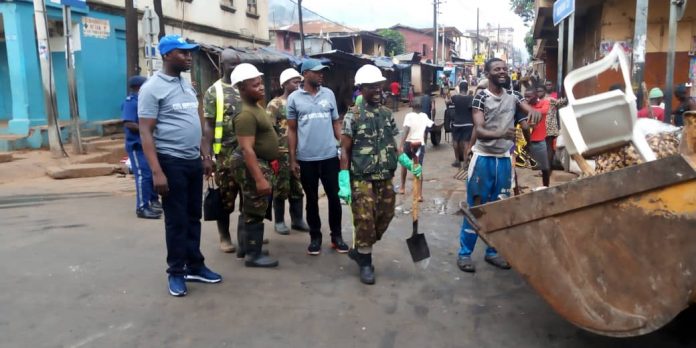The national Coordinator of the Civil Rights Coalition Alphonso Manley has commended the government of President Bio, Mayor Yvonne Aki-Sawyerr of the Freetown City Council, military and police personal, youth groups and community stakeholders for sustainable cleaning exercises since it was declared as a national and monthly exercise by an executive order by President Bio, but stated that more funds need to be allocated to councils nationwide and especially the FCC because they have a lot of work considering the growing population and the geographical settings of the capital, Freetown.
Alphonso made this statement while a team of Civil Rights Coalition staffs went out on Saturday 1st June 2019, to monitor the monthly cleaning exercise within the municipality of Freetown as one of few accredited Civil Society Organizations by FCC to monitor and access the exercise.
Manley stated that the declaration of this First Saturday Monthly Cleaning by President Bio has helped to change the negative narrative of Freetown being ranked among the filthiest city in West Africa. He commended the Mayor of Freetown for implementation of the Flooding Mitigation Plan and actions taken that will give a facelift in the capital for residents and investors.
“These are very good measures for us as a nation, and the cleaning process helps us to avoid water and air borne diseases which cause Malaria, Cholera and other diseases, it a step that also help us to avoid farther diseases and accidents like flooding, adding that when the drainages are clean we experience a free flow of water to the sea.
In highlighting some of the challenges Alphonso Manley stated that shortage of trucks to transport the rubbish to the dump site during the cleaning, jelly cracks, plastic materials and other rubbish deposited in the drainages, lack of proper toilet and wash facilities in some of the market areas also cause the drainages to fill with urine and other rubbish which pose health risks to the traders and household that don’t deposit their waste for the rest of the month until cleaning day.
He added that parent will just send their children to deposit their waste on the street without putting it inside a bag which makes it difficult to load in the trucks, and those who also are in search of metal scraps in the process will scatter the waste and even turn the ones that are in bags onto the streets after which they will just leave everything like that, adding that all these are some of the challenges they observed during the cleaning exercise.
Youth groups at Kissy Road also complained that they have requested the FCC to help them with working tools.
He said to address some of these challenges the Civil Rights Coalition is calling on the government and donor partners to help the councils with funds to procure cleaning tools and trucks that will be used for the intended purpose, more sensitization needing to be done in communities on the cleaning, with council and the Ministry of Health needing to bring back community health monitors like it used to be in the past.
He however stated that we should invest more in prevention than in curing and that the cleaning exercise is one of the ways we use to prevent health hazards.






